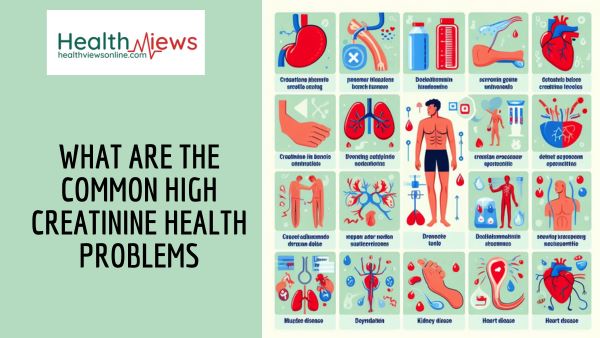When it comes to monitoring our health, paying attention to markers like creatinine levels can provide valuable insights. Creatinine, a waste product produced by our muscles during normal bodily activities, is generally filtered by the kidneys and excreted via urine. An increase in creatinine levels, on the other hand, can indicate significant health problems. In this article, we will explore the array of common high creatinine health problems.
High creatinine levels are frequently linked to a variety of health problems, particularly those impacting renal function. We will look into their symptoms, prevention, and possible remedies for these health issues, to provide a full understanding of the significance of elevated creatinine levels in assessing our overall health.
Also, Read All About Pituitary Adenomas: Types, Symptoms, Causes, Prevention
Top 10 Common High Creatinine Health problems with symptoms, Prevention, and care tips
1. Chronic kidney disease (CKD)
Symptoms – Fatigue, swelling, changes in urination, high blood pressure.
Prevention – Maintain a healthy lifestyle, maintain your blood pressure, manage your diabetes, and stay hydrated.
Care tips – Medication, dietary adjustments, regular check-ups, and a kidney-friendly diet are all recommended.
Also, watch health views web stories: 10 Essential Blood Tests to Get Annually
2. Acute Kidney Injury (AKI)
Symptoms – Decreased urine output, fluid retention, nausea, confusion.
Prevention – Avoid dehydration, monitor medications, and manage underlying conditions.
Care tips – Hospitalisation, dialysis if necessary, treating underlying causes.
3. Diabetes
Symptoms – Excessive thirst, frequent urination, weariness, and hazy vision.
Prevention – Maintain a healthy weight, maintain blood sugar levels, and engage in regular exercise.
Care tips – Medication, insulin, lifestyle adjustments, and blood sugar monitoring are all recommended.
4. High Blood Pressure (Hypertension)
Symptoms – Often asymptomatic; may include headaches, and nosebleeds.
Prevention – Healthy diet, regular exercise, stress management, medication if prescribed.
Care tips – Medications, lifestyle adjustments, and blood pressure monitoring.
5. Dehydration
Symptoms – Dry mouth, dark urine, thirst, fatigue.
Prevention – Drink plenty of water and stay away from caffeine and alcohol.
Care tips – Rehydration and electrolyte replenishment if severe.
6. Urinary Tract Infection (UTI)
Symptoms – Frequent urination, pain or burning during urination, cloudy urine.
Prevention – Maintain good hygiene, stay hydrated, and urinate after sexual activity.
Care tips – Antibiotics, increased fluid intake.
Also, Read What are the 7 Major Sexually Transmitted Infections – STIs
7. Muscle Injury
Symptoms – Muscle pain, weakness, swelling.
Prevention – Proper warm-up, hydration, avoid overexertion.
Care tips – Rest, ice, compression, elevation (RICE), and pain medications if needed.
8. Rhabdomyolysis
Symptoms – Muscle pain, weakness, dark urine, nausea.
Prevention – Prevent muscle injuries, and stay hydrated.
Care tips – Hospitalisation, intravenous fluids, addressing underlying causes.
9. Medication Side Effects
Symptoms – vary depending on the medication.
Prevention – Follow prescribed dosages, and communicate with healthcare providers.
Care tips – Adjust medications under physician supervision.
10. Excessive Meat Consumption
Symptoms – None specific to creatinine elevation
Prevention – Eat a well-balanced diet and minimize your intake of red meat.
Care tips – Make dietary changes and monitor creatinine levels.
In conclusion, being aware of elevated creatinine levels in the blood is critical, as they are frequently used as early markers of many health concerns, particularly those involving renal function. In this article, we have explored the top 10 common high creatinine health problems, along with their associated symptoms, prevention strategies, and care tips.
Each illness, from chronic kidney disease and diabetes to urinary tract infections and muscular injuries, necessitates a distinct approach to monitoring, prevention, and treatment. While some health issues can be addressed by lifestyle modifications and medicine, others may require more severe medical intervention, such as dialysis or hospitalization.
A balanced diet, frequent exercise, sufficient hydration, and regular check-ups are critical for preventing and managing these disorders. It is important to remember that early detection and appropriate care can dramatically improve results for people who have high creatinine levels. Individuals can live healthier lives and lower the risk of consequences by proactively managing excessive creatinine levels and related health problems.
Also, watch health views web stories: 8 Foods That Fulfill Your Vitamin A Dose





